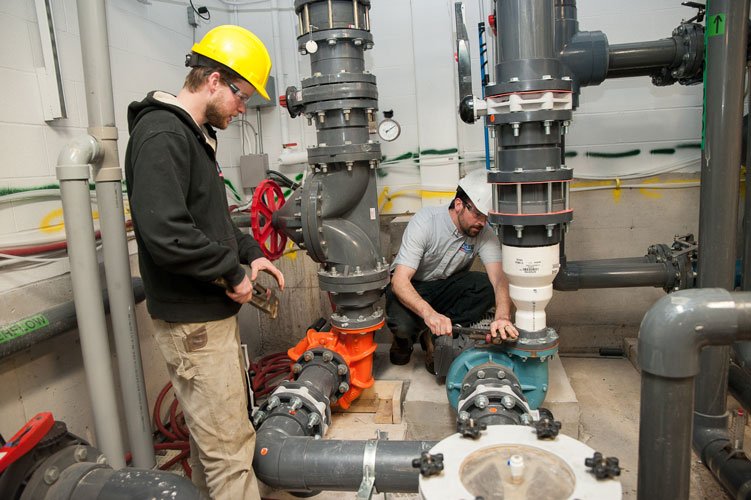Commercial properties serve as the foundation for many individuals’ livelihoods, making it crucial to prioritize their maintenance and efficiency. Among the essential components of commercial properties, plumbing systems stand out as a key element that directly impacts the effectiveness of daily operations. Commercial plumbing plays a vital role in ensuring the functionality and success of businesses across diverse industries.
This post will dive deep into the differences between commercial and residential plumbing, highlight the importance of professional maintenance, installation, and repair in commercial settings, and provide essential information for business owners and managers. Understanding these key aspects will help ensure efficient operations, minimize downtime, and maintain a safe and functional plumbing system in commercial establishments.
Commercial Plumbing vs. Residential Plumbing
Comparing commercial plumbing systems to residential plumbing systems reveals significant differences in terms of scope, usage, and regulatory considerations. Commercial plumbing primarily services large establishments such as hotels, office buildings, hospitals, restaurants, and shopping malls. Residential plumbing primarily serves individual homes.
The amount of water used by commercial properties is a significant distinction between the two. Due to increased foot traffic and the presence of numerous fixtures and specialized equipment, plumbing systems in commercial buildings must be able to accommodate larger conduit sizes and higher flow rates. These systems are designed to accommodate multiple occupants at the same time.
In addition to water consumption, commercial plumbing systems must adhere to codes and regulations established by local authorities and industry standards. Compliance with these regulations ensures commercial spaces’ cleanliness, safety, and efficacy. These regulations cover multiple aspects, including conduit size, water pressure, backflow prevention, and plumbing fixture accessibility. To create a safe, clean, and sanitary environment for employees, customers, and visitors, it is crucial that commercial properties adhere to these standards.
Considering these distinctions, it is clear that commercial plumbing requires specialized knowledge and skill to meet the specific requirements of these large-scale properties.

Importance of Professional Maintenance
Regular professional maintenance is essential for commercial plumbing systems. It helps prevent unexpected breakdowns, detects potential issues early on, and ensures safety and health regulations compliance. Here are some key reasons why professional maintenance is crucial for commercial properties:
- Minimizing Downtime: Commercial establishments rely heavily on their plumbing systems. Any plumbing issues or failures can disrupt business operations, leading to financial losses and inconvenience for customers. Regular maintenance helps identify and address potential problems before they escalate, minimizing downtime and ensuring uninterrupted business activities.
- Extending Lifespan: Commercial plumbing systems are subject to heavy usage, which can result in wear and tear over time. Professional maintenance helps prolong the lifespan of pipes, fixtures, and equipment by identifying and resolving issues that could lead to premature failure or deterioration.
- Ensuring Compliance: Commercial properties must comply with specific plumbing codes and regulations to maintain a safe and hygienic environment. Professional Plumbers Aurora CO are well-versed in these requirements and can ensure that your commercial plumbing system meets all necessary standards.
Professional Installation and Repair
Hiring professionals is of utmost importance when it comes to commercial plumbing installation and repair. Here’s why:
- Expertise and Experience: Commercial plumbing systems are complex, requiring specialized knowledge and experience. Professional plumbers have the expertise to design and install efficient plumbing systems tailored to the unique needs of your commercial property. They also possess the skills to diagnose and repair complex issues accurately.
- Compliance and Permits: Commercial plumbing projects often involve obtaining permits and complying with local building codes and regulations. Professionals are familiar with such requirements and can navigate the process smoothly, ensuring your project meets all necessary standards.
- Advanced Equipment and Techniques: Professional plumbers have access to state-of-the-art tools, equipment, and techniques necessary for efficient and effective installations and repairs. They stay updated with industry advancements, allowing them to provide high-quality workmanship and optimal results.
- Time and Cost Efficiency: Hiring professionals save time and money in the long run. Their expertise reduces the risk of mistakes, ensuring installations are done right the first time. Professional repairs are more likely to be long-lasting, minimizing the need for frequent callbacks or costly emergency repairs.
Conclusion
It’s important for business owners and managers to understand the unique requirements of commercial plumbing. Unlike residential plumbing, commercial plumbing requires specialized knowledge, professional maintenance, and skilled installation and repair.
Commercial establishments can maintain efficient and reliable plumbing systems by prioritizing regular professional maintenance, relying on experts for installations and repairs, and ensuring compliance with codes and regulations. This helps businesses run smoothly, minimizes downtime, and creates a safe and comfortable environment for employees and customers.





